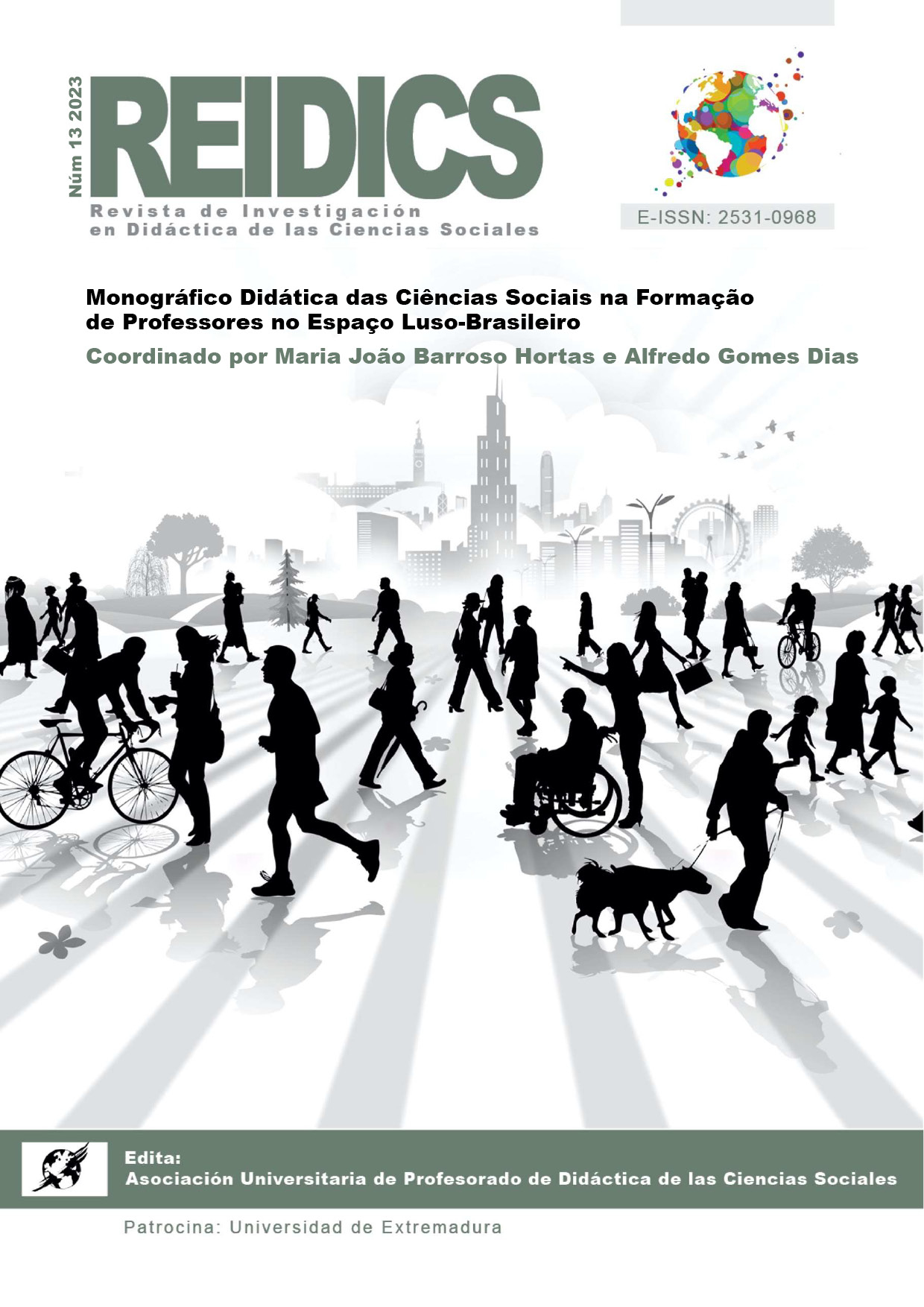Words that give meaning to History - ideas from students at the end of compulsory school cycle and from the MA in History Teaching
DOI:
https://doi.org/10.17398/2531-0968.13.07Keywords:
History; historical learning; historical education; historical consciousness; temporal orientationAbstract
History is assumed as the science that aims to reconstruct the realities of the past, seeking to explain the reasons, motivations and intentions of the actions and interactions between different human beings in different temporal segments, as well as to give meaning to the whole of the historical experience in which the "I" and the "We" are dynamically reconstructed in the temporal flow. This quantitative-descriptive and interpretative study seeks to understand what young people at different stages of training (end of 3rd CEB, secondary school and in the history teaching master's course) understand and what ideas they express about what history is and how it can be useful for their practical life. A questionnaire was applied, in online format (google form), to a universe of 93 participants (stratified convenience sampling), final-year cycle, who were asked to answer two open-ended questions: "Name three words that can summarise what history is for you" and "Name three words in which you indicate what history is for", with a justification. The analysis of the data showed that most students of the 3rd CEB and secondary school express an idea of History in line with a traditional and exemplary historical consciousness, considering that the study of the past is relevant to obtain knowledge, culture and lessons and mistakes. Some secondary school students considering History relevant as a science, and higher education students relating it to memory and as essential for the formation of historical consciousness and identity. The results point to the need to articulate the training of students from different study cycles with the proposals emanating from research in the area of History Education in greater harmony with the curricular guidelines.
References
Atkinson, R. F. (1978). Knowledge and explanation in history: An introduction to the philosophy of history. Macmillan.
Barca, I. (2007). Marcos de consciência histórica de jovens portugueses. In Revista Currículo sem Fronteiras, 7(1), 115-126, Jan/Jun 2007.
Cohen, L., Manion, L. & Morrisson, K. (2001). Research Methods in Education (5th. ed.). Routledge/Falmer.
Despacho n.º 6605-A/2021 de 6 de julho de 2021, procede à definição dos referenciais curriculares das várias dimensões do desenvolvimento curricular, incluindo a avaliação externa.
Erickson, F. (1986). Qualitive Methods in Research on Teaching. In M. Wittrock (Ed.), Handbook of Research on teaching (3.ª Edition), (pp. 119-161). Macmillan.
Gago, M. (2007). Consciência histórica e narrativa na aula de História: concepções de professores. [Tese de Doutoramento]. Universidade do Minho. https://hdl.handle.net/1822/6752
Gago, M. (2018a). Consciência histórica e narrativa na aula de História: conceções de professores. CITCEM – Ed. Afrontamento. https://ler.letras.up.pt/uploads/ficheiros/17446.pdf
Gago, M. (2018b). “Being History Teacher: the beginning of a formative-educational process - Ser Professor de História em tempos difíceis: início de um processo formativo”. In Revista Antíteses, 11(22), 505-515. https://orcid.org/0000-0002-3109-8915
Gallie, W. B. (1964). Philosophy and the historical understanding. Chatto & Windus.
ICS-UMinho (2022a): Página da Licenciatura em História. Disponível em: https://www.ics.uminho.pt/pt/Ensino/Oferta-Formativa-Geral/_layouts/15/UMinho.PortaisUOEI.UI/Pages/CatalogoCursoDetail.aspx?itemId=4226&catId=13
IE-UMinho (2022b): Página do Mestrado em Ensino de História. https://www.ie.uminho.pt/pt/Ensino/mestrados/ensino/Paginas/EnsinodeHistoriano3CiclodoEnsinoBasicoenoEnsinoSecundario.aspx.
Lorenz, C. (1998). “Historical knowledge and historical reality: A plea for «Internal Realism»”. In B., Fay; P., Pomper, & R. Vann (eds.). History and Theory: Contemporary Readings (pp. 342-376). Blackwell Publishers.
Osler, A. & Starkey, H. (2010). Teachers and Human Rigths Education. IoE.
Rüsen, J. (2006). Humanism and nature- some reflections on a complex relationship. The Journal for Transdisciplinary Research in Southern Africa, 2(2), 265-276.
Rüsen, J. (2010). Historizing Humanity-Some Theoretical Considerations on Contextualization and Understanding regarding the Idea of Humanity. Taiwan.
Rüsen, J. (2015). Teoria da História: uma teoria da história como ciência. Editora UFPR.
Rüsen, J. (2016a). “A Função da Didática da História: A Relação entre a Didática da História e a (meta) História”. In Contribuição para uma Teoria da Didática da História (pp. 13-42). W&A Editores.
Rüsen, J. (2016b): “O que é a Cultura Histórica? Reflexões sobre uma nova maneira de abordar a História”. In Contribuição para uma Teoria da Didática da História (pp. 53-91). W&A Editores.
Solé, G. (2021b). Educação Histórica em Portugal: percursos formativos e investigativos na Universidade do Minho. In Luís Alberto Alves, Marília Gago & Mariana Lagarto (Coord). Vinte anos das Jornadas Internacionais de Educação Histórica (pp. 151-167). CITCEM, FLUP, Universidade Porto.
Solé, G. (2021a). Ensino da História em Portugal: o currículo, programas, manuais escolares e formação docente. El Futuro del Pasado, 12, 21-59. https://doi.org/10.14201/fdp2021122159
Solé, G., & Gago, M. (2021). The history teacher education process in Portugal: a mixed method study about professionalism development. Humanit Soc Sci Commun 8, 51. https://doi.org/10.1057/s41599-021-00726-9
Downloads
Published
Issue
Section
License
Aquellos autores/as que tengan publicaciones con esta revista, aceptan los términos siguientes:
- Los autores/as conservarán sus derechos de autoría y garantizarán a la revista el derecho de primera publicación de su obra, el cual estará simultáneamente sujeto a la Licencia de reconocimiento de Creative Commons 4.0 BY-NC-SA que permite a terceros compartir la obra siempre que se indique su autor y su primera publicación en esta revista.
- Los autores/as podrán adoptar otros acuerdos de licencia no exclusiva de distribución de la versión de la obra publicada (p. ej.: depositarla en un archivo telemático institucional o publicarla en un volumen monográfico) siempre que se indique la publicación inicial en esta revista.
- Se permite y recomienda a los autores/as difundir su obra a través de Internet (p. ej.: en archivos telemáticos institucionales o en su página web) antes y durante el proceso de envío, lo cual puede producir intercambios interesantes y aumentar las citas de la obra publicada. (Véase El efecto del acceso abierto).
- Los autores y autoras han respetado la política de autoría de esta revista.




